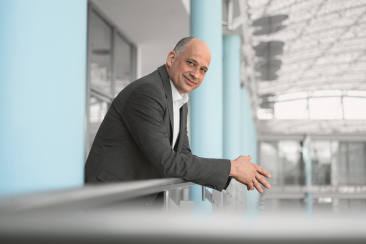
Festo selects winners of the 1st Global Festo Sustainability Award
The sustainability competition took place for the first time and was initiated by the young representatives of the owner family Stoll together with the Festo Didactic training.
"The topic of sustainability is becoming increasingly important for the young generation. In addition, it is becoming increasingly important that social responsibility is also taken on in industry. We want the young Festo employees worldwide to be able to develop their creativity and full potential for the topic of sustainability and for Festo to benefit from their ideas and solutions," says Dr Oliver Niese, Member of the Management Board of Festo Didactic.
The climate and the world are changing. More than ever, role models are needed to lead the change and turn the crisis into an opportunity. Festo training centres can help shape this change and pursue their own projects and goals based on the United Nations' 17 Sustainable Development Goals.
And with success: the winning teams from the six training centres Berkheim, Rohrbach, Budapest, Jinan, Sofia and Bangalore convinced the jury with their innovative solutions.
Sustainability in agriculture
The task was: What role does sustainability play in agriculture and how can agriculture be made sustainable with Festo products? For six months, a total of 28 teams from all six Festo training centres in Germany and abroad worked on exciting projects.
"Agriculture is one of many areas in which we, as an automation company, make an important contribution to sustainability. Through our technologies, we enable the resource-efficient supply of a growing world population - one of the central challenges of our time," says Christian Österle, Vice President Sustainability at Festo.
The winning projects
The winning team from Esslingen developed a cooperative pollinator for bee-poor areas. By using hollow chamber nets, the pollen of the male plants can be whirled up with a pneumatic control via a compressed air pulse and then collected via a vacuum. The full net can then be spread over the desired fields and the pollen can be released onto the plants to be pollinated using compressed air.
The winning team from Budapest developed the idea of the "Egg grinder", the sustainable processing of eggshells into powder. Eggshells are one of the most common forms of food waste. Calcium carbonate is essential for healthy bones and teeth as, together with phosphorus, it gives these structures strength and shape. The calcium carbonate found in eggshells can be used for animal feed, as a substitute for some fertilisers or even in the pharmaceutical industry as a dietary supplement.
The team from Rohrbach came up with the idea of a Vertical Farm by using natural light. The Bangalore team took a similar approach with their Sustainable Vertical Farm project using piezoelectronics and a solar panel, as did the winning team from Jinan, who developed an app-controlled vertical farm as a solution. The team from Sofia developed automated seed planting with Festo technology.
Some of the first prototypes have already been implemented in the training centres. Next year, the success of this year's competition will be followed up with further projects.




